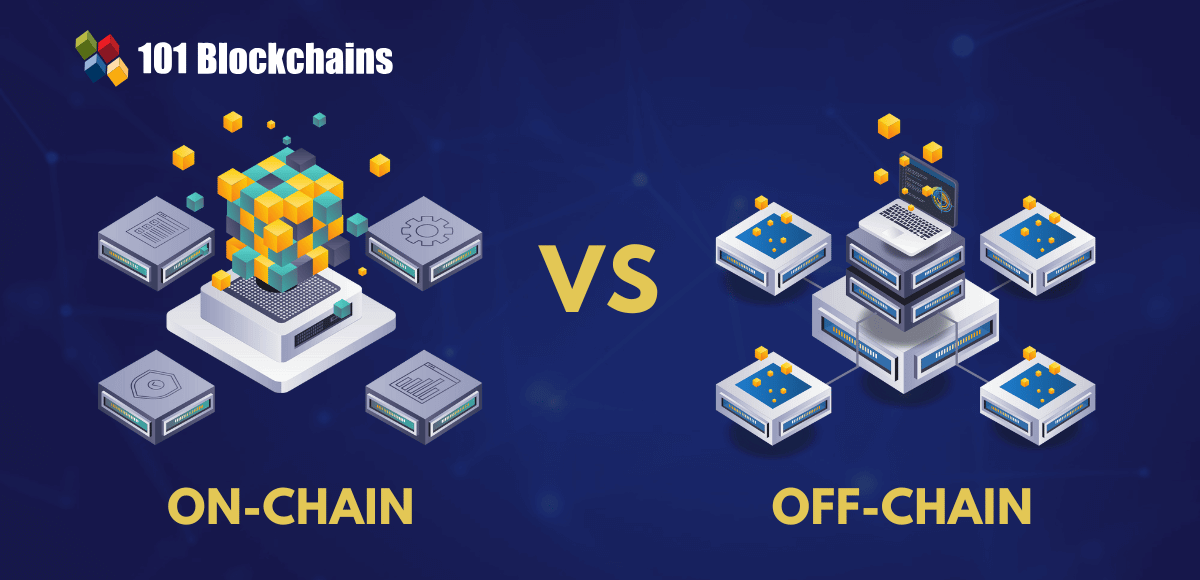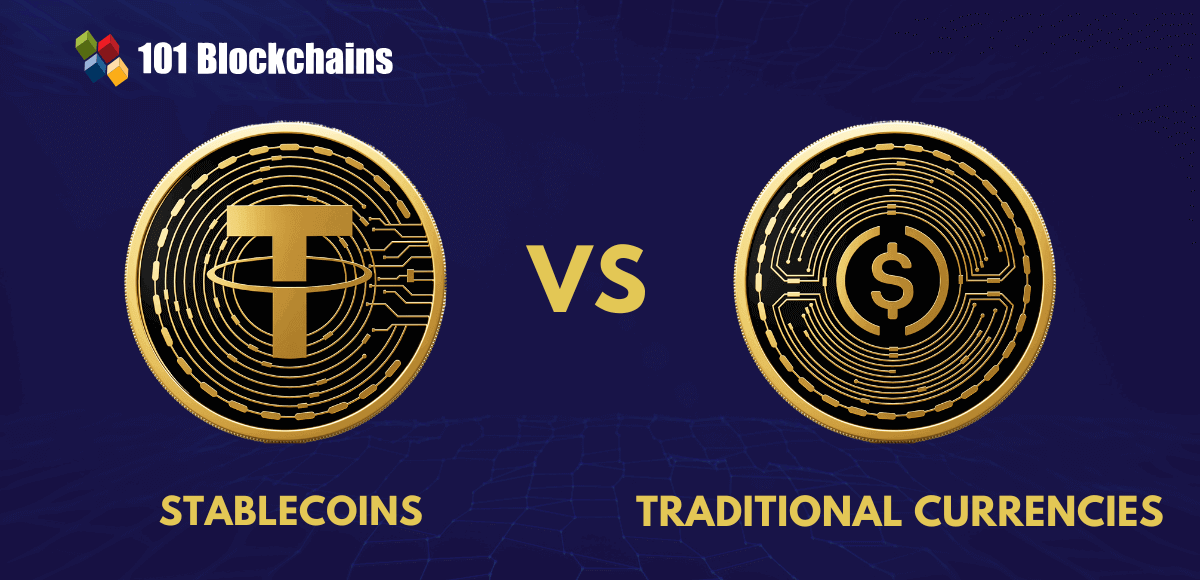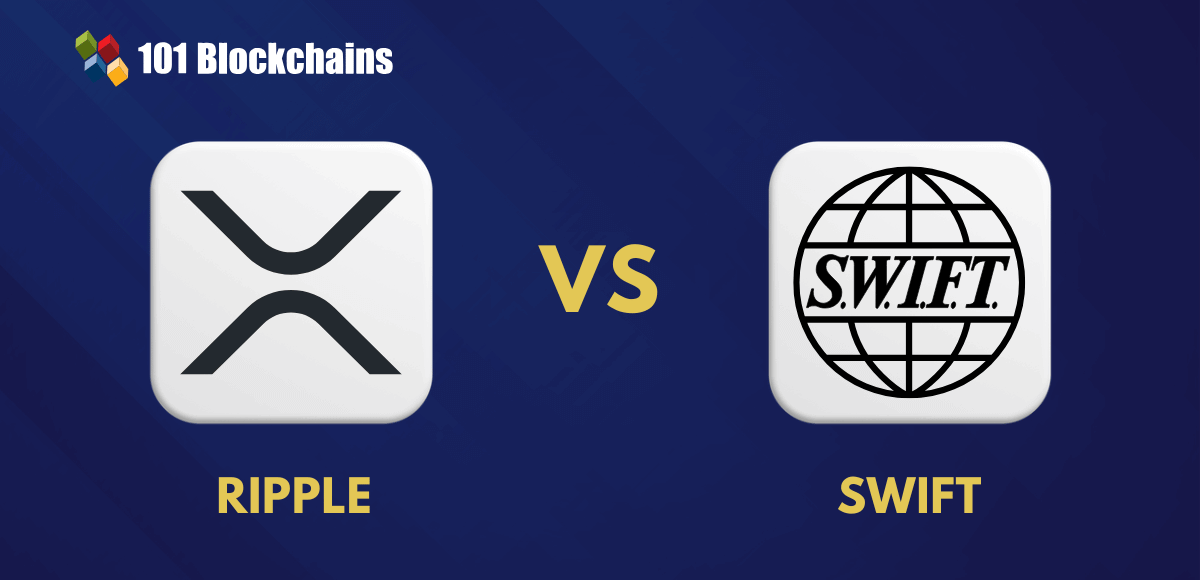Learn how blockchain truly works, master key definitions, and uncover what makes smart contracts so "smart." Dive into the fundamentals, gain valuable insights, and start your blockchain journey today!
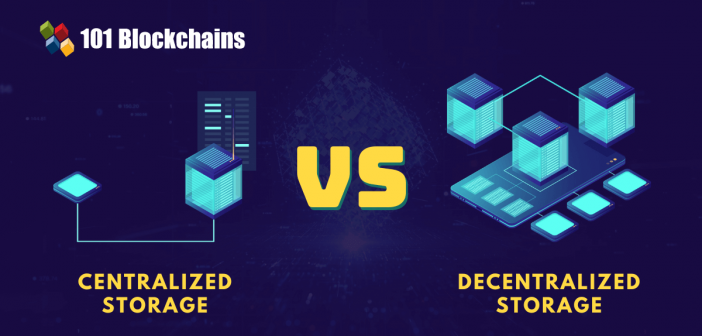
- Comparisons
James Howell
- on June 19, 2023
Centralized vs Decentralized Storage – Key Differences
The centralization vs decentralization debate has been growing stronger with every passing day. If you have been wondering about the difference between centralized and decentralized, then you must know how the structure of the two approaches differ from each other. For example, centralized networks, systems, and applications have all their servers and data stored in a centralized location.
On the other hand, decentralization implies that control would shift from a group of people or an individual toward all members of the organization. The recent hype around the prospects for centralized vs decentralized data comparisons has led to discussions around the use of new decentralized data storage mechanisms. IPFS is one of the leading names you might come across in guides regarding web3 and blockchain architecture. Which one is the better alternative to centralized and decentralized storage?
As of now, decentralization has not matured into a full-fledged concept in the technology landscape. Blockchain has introduced a glimpse of what decentralization could help in achieving. However, blockchain itself is still in the early stages of gaining mainstream adoption. At this point in time, answers to “What is the difference between centralized and decentralized storage?” would have massive implications for the future of technology. Storage is an inevitable requirement of computing or electronic systems, and continuously growing volumes of data require efficient choices for storing data. Let us find out which storage option is a suitable pick for businesses in the following post.
Build your identity as a certified blockchain expert with 101 Blockchains’ Blockchain Certifications designed to provide enhanced career prospects.
Foundations for Centralized vs Decentralized Comparison
The review of head-to-head comparison between centralized and decentralized data can point out how decentralized storage relies on multiple nodes in a network. In addition, you might think about the single point of failure associated with a centralized system. The advantages of centralized vs decentralized storage comparison can help you only if you know why the comparison started in the first place. You can review the history of storage to find out the reasons for which two different paradigms of storage emerged.
In the initial stages of storage system development, file-sharing approaches were rudimentary and basic. Users could store and share data by inserting floppy disks into the CPU and transferring data into the floppy disks. The process of transferring and sharing data through floppy disks was time-consuming and showed problems with data integrity. New storage alternatives such as CDs, hard drives, and flash drives emerged over the course of time and allowed flexible advantages for sharing massive volumes of data.
The arrival of the internet served as the beginning of discussions on the difference between centralized and decentralized storage. With the help of the internet, users can connect to other computers worldwide and access data, pictures, or any file they want from the web. Have you ever thought about how you can obtain files from the internet with a few clicks? When you interact with a website and click on different links, you are practically downloading files from a server to your computer.
You might also be interested in Centralized Vs. Decentralized: What Are The Core Differences?
Problems with Centralized Servers
Servers are an important requirement for ensuring the accessibility of content on the web. In the Web 1.0 model or initial days of the web, users had to work on ownership and maintenance of their own servers. Gradually, web 2.0 introduced the facility of scalable cloud storage, such as AWS S3. The advantage of cloud storage services provided the foundation of answers for “what is centralized storage” as the storage provider had complete control over the servers.
Centralized cloud storage offered the flexibility for scaling up to accommodate increases in traffic. However, the setbacks with conventional centralized storage provided the motivation required to grow decentralized storage solutions. Here are the noticeable setbacks of centralized storage, which decentralized storage aims to achieve.
-
Censorship
The first setback with the centralized model of data storage is the risk of censorship. Did you know that Wikipedia is banned in certain countries? Well, there are no specific reasons for validating the impact of censorship. For example, a dictatorship could impose censorship as a tool for subduing protestors by removing articles that condemn the government and its actions.
The centralized vs decentralized data storage comparison also indicates the ways in which decentralized storage can solve such problems. Decentralization offers safeguards against censorship, thereby serving a promising advantage for freedom of expression.
-
Centralized Control
One of the significant pointers in the comparison between centralized and decentralized data points at centralized control over data. The biggest concern with third-party cloud storage solutions is the transfer of data to a vendor for storage services. In such cases, the centralized company itself does not have control over the data storage and privacy implications.
The difference between centralized and decentralized storage highlights how centralized data storage users give up control over their data. For example, web2 organizations have come under the scanner of government agencies for dubious use of centralized data in their custody. The infamous Cambridge Analytica scandal and the involvement of Facebook have red flags written all over centralized storage uses.
The information of users, including their public profile, page likes, current city, and birthday was used for creating psychographic profiles of users. Based on the profiles, advertisers came up with personalized advertisement content to cater to the interests of a particular person or group. The questions like ‘What is centralized storage’ became popular with allegations of politicians using Facebook data to influence the outcomes of elections.
Want to become an expert in Blockchain Technology? Enroll Now in Certified Enterprise Blockchain Professional (CEBP)!
Does Anyone Care About Your Data?
The basics of centralized storage on cloud servers showcase that it is practically impossible to trust centralized data storage providers. While the involvement of Facebook in the Cambridge Analytica data breach scandal is a major red flag, it is also important to know that there are other similar breaches. The centralized vs decentralized data storage debate can deliver a promising advantage for discovering examples like the Deep Roots Analytics company.
It is a media analytics company that used the Amazon cloud server for storing information of almost 61% of the US population without any password protection. The media analytics company stored the information about the US population for almost two weeks without any protection. The information stored by Deep Roots Analytics includes names, home addresses, voter IDs, email addresses, telephone numbers, and many other details.
Thinking about the potential impact of a breach which can compromise the basic details about users. With the data about almost 61% of the US population at risk, it is important to wonder about the ways in which hackers could have misused the information. Therefore, the centralized vs decentralized storage comparison becomes a necessity for identifying the ways to safeguard the data of users. As a matter of fact, the problems with centralized storage created the foundations for developing decentralized storage solutions.
How Are Decentralized Storage Solutions Better than Centralized Solutions?
The estimate of potential growth estimates for web3 can help in encouraging the concept of a decentralized distribution system rather than choosing a centralized solution. You can learn about conventional cloud computing services and their flexible pricing models for improving storage system efficiency.
However, you would not find details about the setbacks, such as central point of failure. Data should be stored in different nodes of a peer-to-peer network rather than on a centralized server. One of the ultimate goals of web3 revolves around delivering web experiences with advantages of decentralization and censorship resistance. Most important of all, web3 does not require users to give up control of their data.
Learn the fundamentals, challenges and use cases of Web3.0 blockchain. Download the Web3 eBook Now!
Benefits of Decentralized Storage
The benefits or features of decentralized storage can offer a better comparison of difference between centralized and decentralized systems. First of all, you can notice the benefit of security through the use of decentralization in storage. The applications of decentralization in storage systems divide the files of a user and distribute them throughout different nodes on the network. With the data scattered across different nodes of the network, it does not have to face problems with a single point of failure.
Another promising aspect of decentralized storage refers to the assurance of higher availability of data. In the case of centralized systems, you would find that losing one of the centralized servers can lead to downtime. On the other hand, decentralized storage can ensure availability by providing access to data through other nodes. Remember that all the nodes in the peer-to-peer network in decentralized storage would have an updated copy of the distributed database running on the network.
What are the Differences between Centralized and Decentralized Storage?
The review of answers to ‘What is centralized storage’ and investigation of the fundamentals of decentralized storage provide a clear glimpse of the differences between them. However, it is also important to learn about the head-to-head differences between the two popular data storage approaches.
Here are the noticeable pointers for comparing centralized storage with decentralized storage.
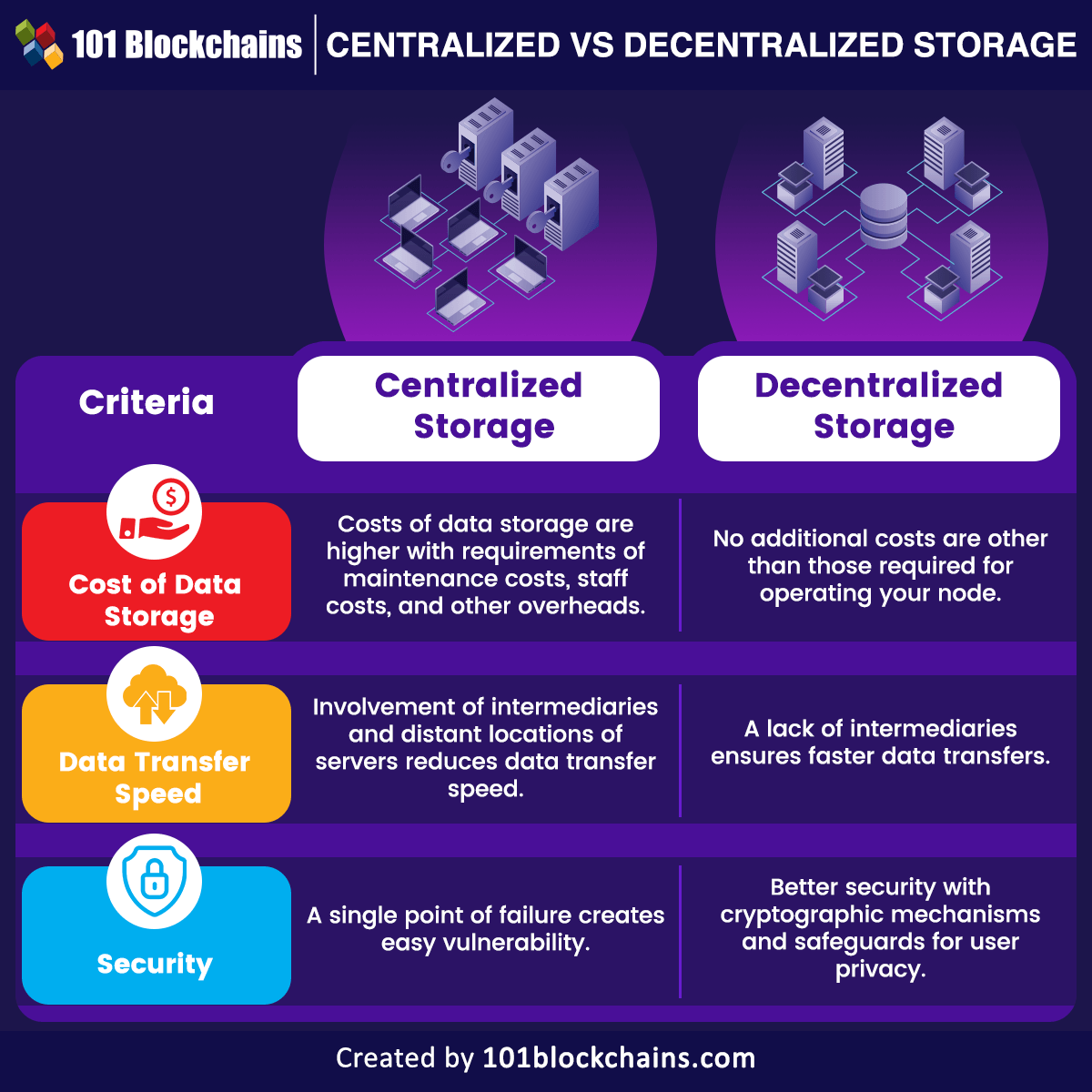
-
Costs of Storage
One of the first highlights in the comparison between decentralized and centralized storage refers to the costs of the storage systems. In the case of centralized data storage, you have to take on the burden of many costs, such as employee wages, management costs, rents for data centers, legal and accounting costs, and overheads. Furthermore, the burden of the data migration cost between two centralized storage platforms is significantly high.
On the other side of the centralized vs decentralized data storage debate, decentralized data storage relieves many costs. For example, you don’t have to worry about maintenance costs and rent for the data server. On top of it, interoperability ensures that you can migrate data between two decentralized storage platforms with minimal costs.
-
Data Transfer Speed
The next vital pointer for comparing centralized data storage with decentralized data storage systems is the speed of data transfer. In centralized data storage, the cloud server is generally located in a distant location, far away from the user location. On top of it, the user’s request for data must pass through multiple stages of approval from different intermediaries.
As a result, the speed of data transmission becomes significantly lower. The answers to “What is the difference between centralized and decentralized storage?” would reflect on how decentralized storage removes the concerns regarding intermediaries. You don’t have to worry about passing the data file through multiple intermediaries for passing information.
-
Security
The most striking element of centralization is the fact that centralized systems store data in one place. Centralized servers are also located in remote locations where disaster response cannot arrive early. Therefore, centralized data storage systems are at risk of physical threats as well as cybersecurity threats. On the other hand, decentralized storage can provide better security with the advantage of cryptography and new solutions, such as zero-knowledge proofs, which safeguard user privacy.
Centralized systems can involve unwanted intervention and manipulation of data by the server owners or storage service vendors. In the case of decentralized storage, any modification to the ledger is reflected in the ledger copies of all network members. Therefore, it is difficult to tamper with user data security and privacy on decentralized storage.
Final Words
The review of the centralized vs decentralized storage comparison reveals that centralized and decentralized storage have their unique advantages. For example, centralization offers better control to businesses over user data. On the other hand, decentralized storage provides better results in terms of security and privacy.
The growth of web3 has fuelled discussions around decentralized storage and its applications. You can learn more about the use cases of decentralized storage and popular alternatives to find their benefits and value implications. Start your journey of learning about decentralized storage alternatives now.




